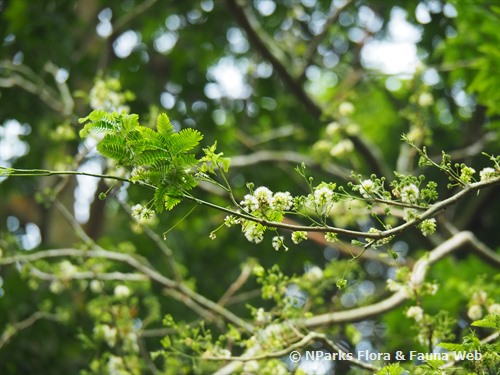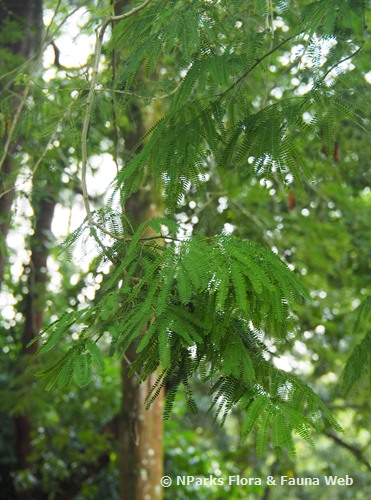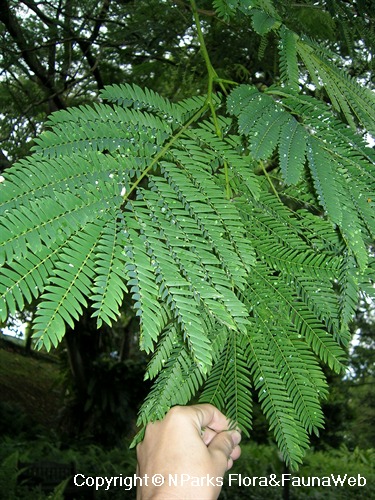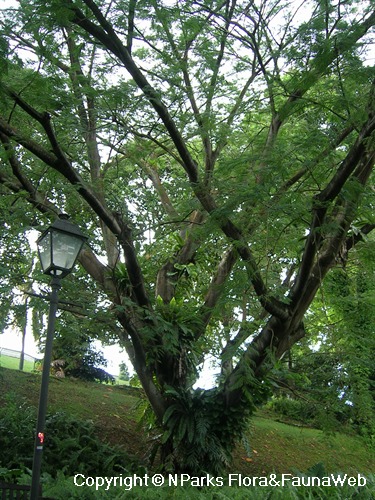
Back
Enterolobium cyclocarpum
| Family Name: | Fabaceae (Leguminosae) |
| Synonyms: | Samanea cyclocarpum, Mimosa cyclocarpa |
| Common Name: | Earpod Tree, Elephant's Ear Tree, Devil's Ear Tree, Monkeysoap |
Name
Classifications and Characteristics
| Plant Growth Form | Tree |
|---|---|
| Mode of Nutrition | Autotrophic |
Biogeography
| Native Distribution | Mexico, Brazil, Colombia, Venezuela, Central America |
|---|---|
| Native Habitat | Terrestrial |
| Preferred Climate Zone | Tropical |
| Local Conservation Status | Non-native |
Description and Ethnobotany
| Growth Form | Large tree, able to grow up to about 40 m tall in its natural habitat. |
|---|---|
| Crown | Wide spreading crown. |
| Trunk | Bark is light grey and surface lenticellate. |
| Foliage | Light green bipinnately compound leaves, alternate arrangement and measuring about 15 - 40 cm long and 17 cm wide, petiole about 2 - 6 cm long, each leaf consists of about 40 - 70 narrowly oblong leaflets about 8 - 15 mm long and 2 - 4 mm wide. |
| Flowers | Small, white flowers borne in a compact, rounded inflorescence. |
| Fruit | Fruit is an indehiscent brown ear-shaped pod, contains 8 - 16 oval-shaped seeds. |
| Habitat | Can be found in subtropical, dry forests. |
| Etymology | Genus Enterolobium comes from Greek words "enteron" which means "intestine" and "lobos" which means "pod" and possible refers to the material inside the seed pod. Species cyclocarpus means having circular fruits. The common name "Earpod Tree" is also derived from the ear-shaped fruit. |
| Ethnobotanical Uses | Edible Plant Parts : Edible Seeds Medicinal: An extract from the bark can be used to treat bronchitis and colds. Timber & Products: Wood can be used for making boats and producing quality paper. Cultural / Religious: Heritage Tree : There is currently one Enterolobium cyclocarpum listed as a Heritage Tree in Singapore. It can be found at Fort Canning Park. To find out more about this tree, please visit the Heritage Tree Register. |
Landscaping Features
| Desirable Plant Features | Ornamental Flowers, Ornamental Fruits |
|---|---|
| Landscape Uses | Parks & Gardens |
Plant Care and Propagation
| Light Preference | Full Sun |
|---|---|
| Water Preference | Moderate Water |
| Plant Growth Rate | Moderate |
| Rootzone Tolerance | Moist Soils, Well-Drained Soils |
| Propagation Method | Seed |
Foliar
| Mature Foliage Colour(s) | Green |
|---|---|
| Foliar Type | Compound (Bipinnate) |
Floral (Angiosperm)
| Flower Colour(s) | White |
|---|---|
| Flower Grouping | Cluster / Inflorescence |
Fruit, Seed and Spore
| Mature Fruit Colour(s) | Brown |
|---|---|
| Seed Quantity Per Fruit | Several (11-20) |
Image Repository
Others
| Master ID | 1584 |
|---|---|
| Species ID | 2877 |
| Flora Disclaimer | The information in this website has been compiled from reliable sources, such as reference works on medicinal plants. It is not a substitute for medical advice or treatment and NParks does not purport to provide any medical advice. Readers should always consult his/her physician before using or consuming a plant for medicinal purposes. |



